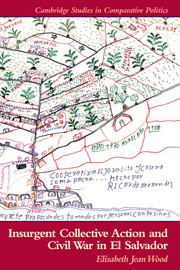Book contents
- Frontmatter
- Contents
- List of Illustrations and Tables
- Preface and Acknowledgments
- List of Abbreviations
- 1 THE PUZZLE OF INSURGENT COLLECTIVE ACTION
- 2 ETHNOGRAPHIC RESEARCH IN THE SHADOW OF CIVIL WAR
- 3 REDRAWING THE BOUNDARIES OF CLASS AND CITIZENSHIP
- 4 FROM POLITICAL MOBILIZATION TO ARMED INSURGENCY
- 5 THE POLITICAL FOUNDATIONS OF DUAL SOVEREIGNTY
- 6 THE REEMERGENCE OF CIVIL SOCIETY
- 7 CAMPESINO ACCOUNTS OF INSURGENT PARTICIPATION
- 8 EXPLAINING INSURGENT COLLECTIVE ACTION
- Epilogue: Legacies of an Agrarian Insurgency
- Appendix: A Model of High-Risk Collective Action by Subordinate Social Actors
- Chronology of El Salvador's Civil War
- References
- Index
- Other Books in the Series
3 - REDRAWING THE BOUNDARIES OF CLASS AND CITIZENSHIP
Published online by Cambridge University Press: 05 June 2012
- Frontmatter
- Contents
- List of Illustrations and Tables
- Preface and Acknowledgments
- List of Abbreviations
- 1 THE PUZZLE OF INSURGENT COLLECTIVE ACTION
- 2 ETHNOGRAPHIC RESEARCH IN THE SHADOW OF CIVIL WAR
- 3 REDRAWING THE BOUNDARIES OF CLASS AND CITIZENSHIP
- 4 FROM POLITICAL MOBILIZATION TO ARMED INSURGENCY
- 5 THE POLITICAL FOUNDATIONS OF DUAL SOVEREIGNTY
- 6 THE REEMERGENCE OF CIVIL SOCIETY
- 7 CAMPESINO ACCOUNTS OF INSURGENT PARTICIPATION
- 8 EXPLAINING INSURGENT COLLECTIVE ACTION
- Epilogue: Legacies of an Agrarian Insurgency
- Appendix: A Model of High-Risk Collective Action by Subordinate Social Actors
- Chronology of El Salvador's Civil War
- References
- Index
- Other Books in the Series
Summary
We felt the poverty in our own flesh. The pain that we are now suffering in our bodies is the labor of the birth of something new.
Campesina, Tierra Blanca, 1992On January 16, 1992, the Plaza Cívica in downtown San Salvador overflowed with a festive crowd, many carrying FMLN flags or wearing FMLN bandanas or headbands. Enormous banners proclaiming support for the FMLN and other insurgent organizations hung from the National Palace and the cathedral. At noon the cathedral bells tolled in the peace, shortly before the signing in Mexico of the agreement that ended more than a decade of war. One of the FMLN's clandestine radio stations broadcast the speeches and music from the cathedral. Many in the plaza, including some members of the FMLN's General Command and several regional commanders, had not been seen in the capital for more than a decade. I saw a number of reunions of people separated by the vagaries of the war, including one in which both had believed the other dead for years. Between blaring dance numbers, speakers celebrated the peace agreement as an insurgent victory, reiterating the theme that the FMLN had forced the government to negotiate a transition to democracy, allowing political participation of the left for the first time.
Two blocks away in the Parque de la Libertad, the governing ARENA party celebrated its own interpretation of the signing, lauding the contributions of President Alfredo Cristiani to freedom, peace, and the successful defense of the country from communism.
- Type
- Chapter
- Information
- Insurgent Collective Action and Civil War in El Salvador , pp. 51 - 86Publisher: Cambridge University PressPrint publication year: 2003



